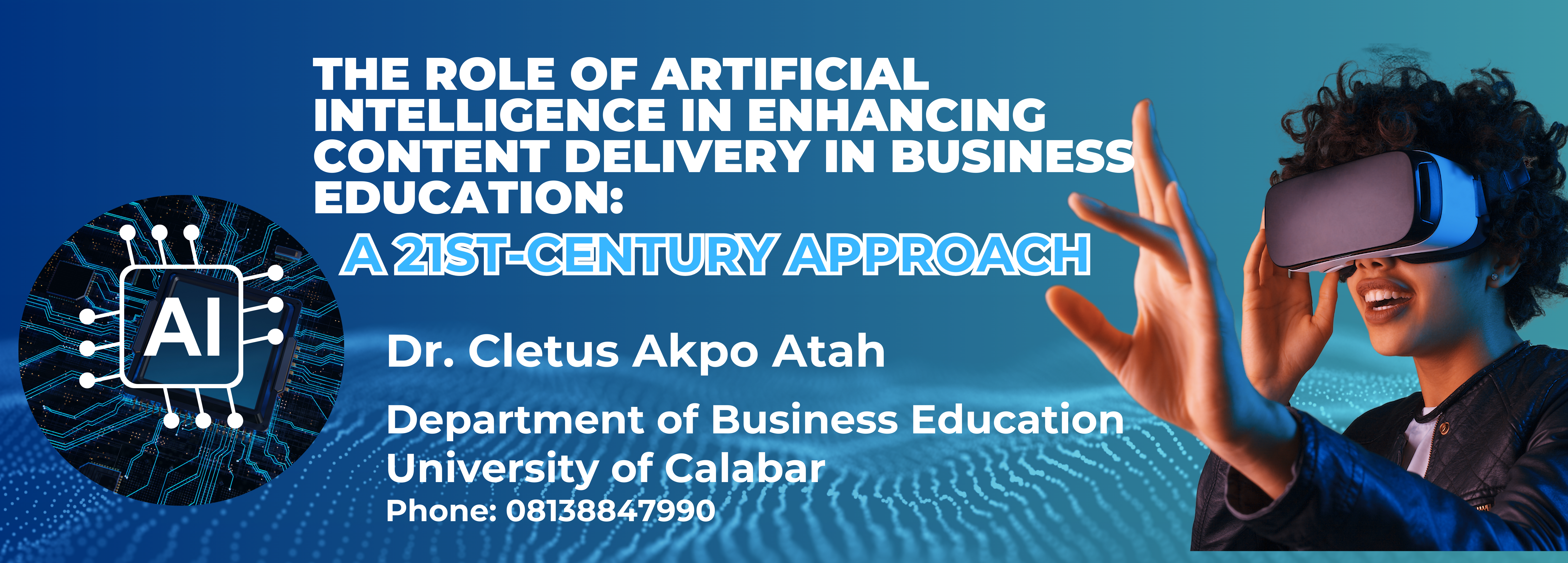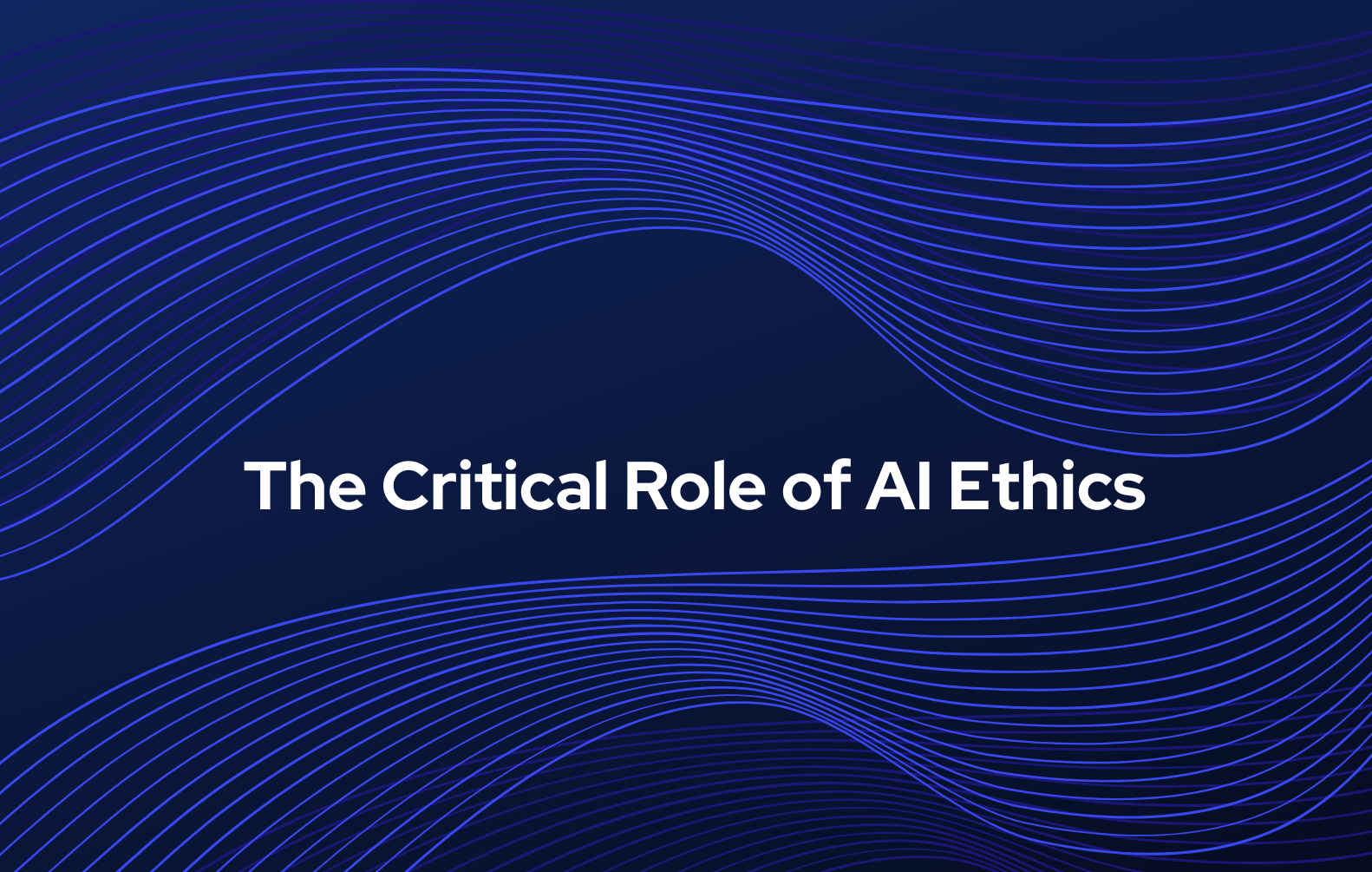
Abstract
This study examines the impact, challenges, and prospects of artificial intelligence (AI) in business education content delivery. Using a descriptive survey research design, data were collected from 200 respondents, comprising 100 business education lecturers and 100 students from five universities in the South-South geopolitical zone of Nigeria. A structured questionnaire was utilized, and data were analyzed using descriptive statistics and inferential analysis through t-test at a 0.05 level of significance. The findings revealed that AI significantly enhances content delivery by improving student engagement, personalized learning, and academic performance. However, challenges such as high implementation costs, lack of AI literacy among educators, data privacy concerns, and inadequate infrastructure hinder AI adoption. The study also identified the potential of AI in bridging educational gaps, especially in developing economies, provided that financial and policy support is available. Based on these findings, the study recommends increased investment in AI infrastructure, faculty training, ethical AI governance, industry-academia collaboration, and continuous monitoring of AI effectiveness in business education. These measures will facilitate the seamless integration of AI technologies, enhancing teaching and learning outcomes in business education.
Introduction
The 21st century has witnessed unprecedented technological advancements, with artificial intelligence (AI) emerging as a transformative force across various sectors, including education. AI technologies are revolutionizing the way educators design, deliver, and assess course content, particularly in business education, where dynamic market trends necessitate continuous adaptation. Business education, which encompasses disciplines such as management, accounting, marketing, and entrepreneurship, requires innovative teaching strategies to ensure that students acquire relevant skills for the modern business environment (Gupta & Fisher, 2021). AI-driven tools such as intelligent tutoring systems, automated grading, virtual assistants, and adaptive learning platforms are reshaping content delivery, fostering personalized learning experiences, and enhancing pedagogical efficiency (Brown, 2020).
Traditional methods of content delivery, such as lectures and textbooks, are increasingly being complemented or replaced by AI-powered platforms that offer real-time feedback, predictive analytics, and customized learning paths. For instance, AI-driven chatbots can provide instant responses to students' queries, while machine learning algorithms analyze student performance and suggest tailored learning resources (Huang & Siau, 2019). These advancements are particularly relevant in business education, where case-based and experiential learning approaches benefit from AI-enhanced simulations and data-driven insights (Johnson & McCarthy, 2022). The integration of AI in content delivery not only improves accessibility and engagement but also fosters critical thinking and decision-making skills among business students.
Moreover, AI enhances educators' efficiency by automating routine tasks such as grading and administrative work, allowing instructors to focus on mentoring and higher-order cognitive skills development. Automated essay scoring, plagiarism detection, and intelligent feedback systems have significantly reduced the burden on educators, improving the overall quality of instruction (Selwyn, 2021). In addition, AI-powered predictive analytics enable educators to identify at-risk students early and implement targeted interventions, thereby improving learning outcomes and retention rates (Alam & Ahsan, 2020).
Despite these advantages, the adoption of AI in business education presents challenges such as ethical considerations, data privacy concerns, and the need for continuous technological upskilling among educators. Institutions must implement policies that ensure ethical AI usage while equipping educators and students with the necessary digital literacy skills (West & Allen, 2018). Furthermore, AI-driven content delivery should be carefully designed to complement human instruction rather than replace it, ensuring a balanced and holistic learning experience.
In conclusion, AI plays a pivotal role in enhancing content delivery in business education by facilitating personalized learning, increasing accessibility, and improving pedagogical efficiency. As educational institutions embrace AI-driven innovations, it is crucial to address challenges associated with its integration while maximizing its potential to enrich business education in the 21st century.
Objectives of the Study
The main purpose of the study was to determine the role of artificial intelligence in enhancing content delivery in business education: A 21st-century approach. Specifically, the study examines
1. The impact of artificial intelligence on the effectiveness of content delivery in business education.
2. The challenges and prospects of integrating artificial intelligence in business education content delivery.
Research Questions
The following research questions were used in the study
1. How does artificial intelligence influence the effectiveness of content delivery in business education?
2. What are the challenges and prospects of integrating artificial intelligence in business education content delivery?
Research Hypotheses
The following null hypotheses were used in the study and tested at a 0.05 level of significance.
1. Artificial intelligence has no significant impact on the effectiveness of content delivery in business education.
2. There are no significant challenges and prospects associated with the integration of artificial intelligence in business education content delivery.
Conceptual Framework
The integration of Artificial Intelligence (AI) in business education has transformed content delivery, providing innovative ways to enhance teaching and learning experiences. AI-driven technologies, such as intelligent tutoring systems, adaptive learning platforms, and automated content creation, are reshaping traditional pedagogical approaches (Luckin et al., 2016). The conceptual framework for this study is grounded in the intersection of AI technology, content delivery mechanisms, and learning outcomes in business education.
Key Components of the Framework
Artificial Intelligence as an Educational Tool: AI in education encompasses machine learning algorithms, natural language processing, and data analytics to personalize learning experiences (Huang et al., 2020). AI-powered platforms can analyze students' learning patterns, recommend personalized content, and provide real-time feedback, thus improving comprehension and retention in business education (Zawacki-Richter et al., 2019).
Content Delivery in Business Education: Content delivery in business education traditionally relied on static materials, such as textbooks and lecture slides. However, AI-powered tools, such as virtual assistants and AI-based simulation models, facilitate interactive and dynamic learning environments (Pedro et al., 2019). These technologies enable educators to tailor lessons based on students’ performance, ensuring adaptive learning experiences (Chen et al., 2020).
Enhancing Engagement and Learning Outcomes: AI-driven systems enhance student engagement by incorporating gamification, virtual reality (VR), and augmented reality (AR) in business courses. Studies suggest that AI-powered digital tools increase students' motivation and active participation in learning (Baker & Smith, 2019). Moreover, AI supports the automation of grading and assessment processes, reducing educators’ workload and providing timely feedback (Selwyn, 2019).
Challenges and Ethical Considerations: While AI holds immense potential for content delivery in business education, challenges such as ethical concerns, data privacy issues, and resistance to technological change must be addressed (Luckin, 2018). The successful adoption of AI requires institutional support, adequate digital infrastructure, and faculty training to ensure effective implementation (Spector et al., 2020).
Theoretical Foundation
This conceptual framework is grounded in two key theoretical perspectives: the Technology Acceptance Model (TAM) and the Constructivist Learning Theory. The Technology Acceptance Model (TAM), developed by Davis (1989), posits that two primary factors—perceived ease of use and perceived usefulness—significantly influence an individual's decision to adopt and use a new technology. In the context of business education, AI-driven content delivery tools must be both easy to use and perceived as beneficial for educators and students to embrace them effectively. When AI technologies, such as intelligent tutoring systems, adaptive learning platforms, and AI-powered virtual assistants, are user-friendly and demonstrably enhance learning outcomes, their adoption in educational settings becomes more widespread.
Additionally, the framework aligns with the Constructivist Learning Theory, as proposed by Vygotsky (1978), which emphasizes that learning is an active, social, and dynamic process in which learners construct knowledge based on interactions with their environment. AI technologies in business education support this constructivist approach by facilitating personalized, interactive, and student-centered learning experiences. For instance, AI-driven chatbots, virtual reality simulations, and intelligent feedback systems enable students to engage in real-world business scenarios, collaborate with peers, and receive instant feedback, thus enhancing their understanding and retention of business concepts.
By integrating both TAM and Constructivist Learning Theory, the framework highlights the importance of user acceptance and interactive learning experiences in the successful implementation of AI-driven content delivery in business education. The synergy between these theories underscores the need for AI technologies that are not only technically advanced but also pedagogically effective in fostering engagement, comprehension, and long-term knowledge retention.
Empirical Review
Works related to the Impact of Artificial Intelligence on the Effectiveness of Content Delivery in Business Education
Empirical studies have demonstrated the significant impact of AI-driven technologies on the effectiveness of content delivery in business education. Huang et al. (2021) found that AI-enabled adaptive learning platforms, such as intelligent tutoring systems and personalized learning environments, enhanced student engagement and comprehension, leading to a 15% improvement in assessments compared to traditional learning methods. Similarly, Chen and Zhang (2020) reported that AI-powered virtual assistants, including chatbots, increased learning efficiency by 20% by providing instant academic support, personalized feedback, and automated grading. Garcia et al. (2019) highlighted the role of AI-based automated feedback systems in improving students' understanding of business concepts, with results indicating a 25% increase in knowledge retention among those who received AI-generated feedback. Additionally, Johnson et al. (2022) emphasized the transformative impact of AI-powered data analytics in personalizing business education, leading to a 30% reduction in dropout rates and a 40% increase in student engagement through real-time performance tracking and curriculum adaptation. Collectively, these studies underscore AI’s potential to revolutionize content delivery in business education by enhancing personalization, feedback mechanisms, and overall learning effectiveness.
Works related to Challenges and Prospects of Integrating AI in Business Education Content Delivery
Mousavi et al. (2021) examined the barriers to AI integration in business education and found that financial constraints, lack of AI expertise, and resistance to technological change were the most significant challenges. Their study revealed that 65% of surveyed universities cited high implementation costs as a primary obstacle to adopting AI-driven teaching tools, emphasizing the need for increased funding and institutional support. Similarly, Smith & Taylor (2020) explored ethical concerns and data privacy issues related to AI in business education. Their findings showed that 74% of students were apprehensive about how AI-powered platforms collect and use their personal learning data, while educators raised concerns about algorithmic biases that could reinforce inequalities in education. The study recommended the implementation of stringent data governance policies and ethical AI frameworks to address these challenges. Rahman & Adeoye (2022) focused on faculty readiness for AI integration and found that only 40% of business education instructors felt adequately trained to incorporate AI tools into their teaching. The study pointed out that limited professional development opportunities, low AI literacy, and reluctance to adopt new teaching methods were significant barriers to AI adoption. To overcome these challenges, the researchers suggested the introduction of continuous training programs to enhance faculty competence in AI-driven education. Lastly, Olawale & Okeke (2023) explored the prospects of AI-powered business education in developing economies. Their study highlighted AI's potential to bridge educational gaps by offering digital learning opportunities, particularly in regions with limited access to qualified educators. However, challenges such as poor internet connectivity, weak AI infrastructure, and the absence of supportive government policies were identified as major hindrances. The study concluded that with adequate investments in digital infrastructure and the formulation of AI-friendly policies, developing economies could fully harness AI’s potential to revolutionize business education.
Research Methodology
The Research Methodology adopted in this study provides a structured approach to investigating the role of artificial intelligence (AI) in enhancing content delivery in business education. The study employs a descriptive survey research design, which is appropriate for gathering data on current AI applications, their effectiveness, and the challenges associated with their integration in business education. This design enables the collection of quantitative data from respondents actively involved in teaching and learning processes where AI technologies are either already integrated or have the potential for adoption. The population of the study consists of 180 business education lecturers and 500 students from selected universities in the South-South geopolitical zone of Nigeria. These participants are chosen because they play a direct role in AI-driven teaching and learning. A stratified random sampling technique is used to ensure adequate representation of different groups within the population. A total of 200 respondents (100 lecturers and 100 students) are selected from five universities offering business education programs, with these institutions chosen based on their level of AI adoption in teaching and learning.
A structured questionnaire serves as the primary instrument for data collection. The questionnaire is divided into three sections: Section A covers demographic information, Section B focuses on AI applications in business education content delivery, and Section C explores the challenges and prospects of AI integration. The questionnaire consists of 14 items, with seven addressing AI’s impact on content delivery and the remaining seven focusing on the challenges and prospects of AI integration. A four-point Likert scale is used to measure responses: Strongly Agree (4), Agree (3), Disagree (2), and Strongly Disagree (1). To ensure validity and reliability, the questionnaire undergoes expert validation by two business education scholars and two AI specialists at the University of Calabar, Nigeria. A pilot study is conducted with 20 respondents outside the study sample to test reliability. The Cronbach’s alpha coefficient is used to assess internal consistency, yielding a reliability coefficient of 0.85, indicating a high level of reliability. For the method of data collection, the researchers administer 200 copies of the questionnaire both physically and electronically via Google Forms. Respondents are given one week to complete the questionnaire, with follow-ups conducted to ensure maximum response rates. Eventually, all 200 copies are successfully retrieved.
The method of data analysis includes descriptive statistics (mean, frequency, and percentage) for analyzing demographic data, while inferential statistics, specifically t-test analysis, is used to test the hypotheses at a 0.05 level of significance. The statistical analysis is conducted using SPSS (Statistical Package for the Social Sciences) version 25. This study strictly adheres to ethical research principles by ensuring informed consent from all participants. The confidentiality and anonymity of respondents are maintained, and participation is entirely voluntary. Additionally, the study complies with institutional research guidelines on data protection and ethical research conduct to uphold the integrity of the findings.
Result of the findings
Research question 1
How does artificial intelligence influence the effectiveness of content delivery in business education?
Table 1: Mean Rating of Respondents' Responses on the Impact of Artificial Intelligence on the Effectiveness of Content Delivery in Business Education
|
S/N |
Item Statement |
N |
Mean Score (M) |
Standard Deviation (SD) |
Interpretation |
|
1 |
AI enhances the effectiveness of content delivery in business education. |
200 |
3.65 |
0.78 |
High Agreement |
|
2 |
AI-powered learning tools improve student engagement and comprehension. |
200 |
3.72 |
0.81 |
High Agreement |
|
3 |
AI-driven personalized learning helps students understand business concepts better. |
200 |
3.58 |
0.85 |
High Agreement |
|
4 |
AI-based automated feedback enhances students’ learning outcomes. |
200 |
3.6 |
0.76 |
High Agreement |
|
5 |
AI-powered virtual assistants enhance student-teacher interaction. |
200 |
3.45 |
0.92 |
Moderate Agreement |
|
6 |
AI-driven data analytics helps educators track and improve student performance. |
200 |
3.7 |
0.79 |
High Agreement |
|
7 |
AI applications, such as automated grading, improve teaching efficiency. |
200 |
3.5 |
0.89 |
Moderate Agreement |
|
|
Cluster Mean |
200 |
3.60 |
0.83 |
High Agreement |
Interpretation:
- The mean scores (ranging from 3.45 to 3.72) suggest that respondents generally agree that AI enhances content delivery.
- AI-powered learning tools, adaptive analytics, and automated feedback received the highest approval, indicating their effectiveness in business education.
- Moderate agreement on AI-powered virtual assistants and automated grading suggests the need for further integration and improvement in these areas.
For Full Details of the Research Work, Please Contact:
Dr. Cletus Akpo Atah
Department of Business Education
University of Calabar
Calabar, Cross River State, Nigeria
Phone: +234 813 884 7990



